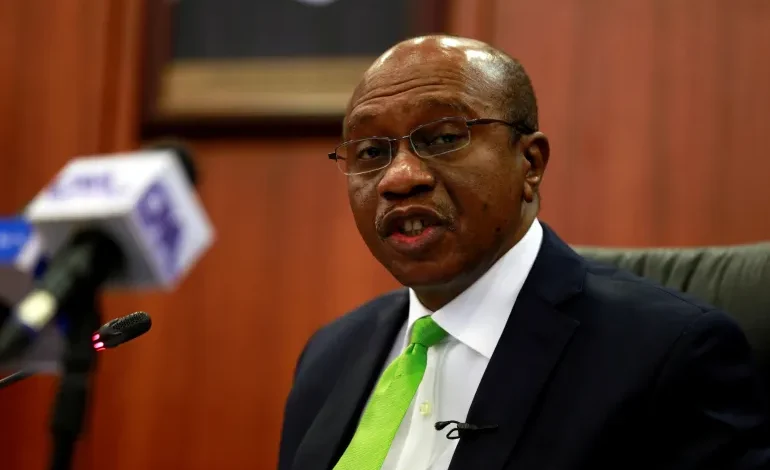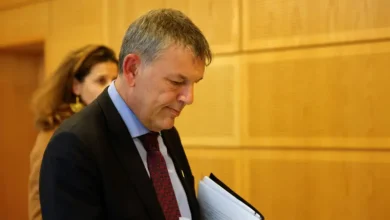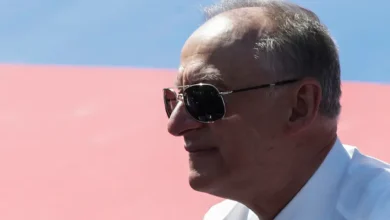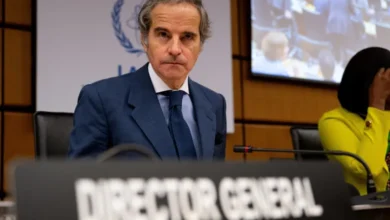How Emefiele, Nigeria’s powerful central bank chief lost his seat

Last Friday Nigeria’s new President Bola Tinubu suspended the country’s Central Bank Governor Godwin Emefiele. On Saturday, Nigeria’s secret police confirmed the erstwhile top banker has been arrested and is in custody for interrogation.
The charges have not been made public, but a government press release cited “an ongoing investigation of his office and planned reforms in the financial sector of the economy” as reasons for the suspension.This caps the fall of arguably one of the most powerful men in the Nigerian government.
Appointed in 2014 by then-President Goodluck Johnathan to head the central bank of Africa’s biggest economy, Emefiele became the second-longest-serving governor of the bank after his tenure was renewed by former President Muhammadu Buhari.
Buhari’s administration between 2015 and 2023 led Nigeria into two recessions. Inflation hit an 18-year record high of 22.22 percent, and the country’s debt profile soared to more than $150bn, also a record and more than three times the debt left by the previous government, according to the Debt Management Office.
Emefiele served under Buhari for eight years, overseeing Nigeria’s biggest economic downturn.“He had no vision for the monetary policy of the country. He had risen to the top of his career as a yes-man to those who put him in position,” Cheta Nwanze, lead partner at SBM Intelligence, a geo-political consultancy, told Al Jazeera.
‘Emperor Meffy’
By convention, central bank governors operate in the shadows, maintaining a distance from politics. But analysts say Emefiele played an outsized role in both politics and the economy as the governor of the apex bank.
“The phrase I will use to characterise the CBN [Central Bank of Nigeria] in this period is all-powerful,” said Michael Famoroti, the head of intelligence at business and economic insights firm Stears and former chief economist at Vetiva Capital. “For the first time in Nigeria’s economic history, we have a central bank that was essentially the most powerful form of economic authority in the country … That [power] is normally between the Ministry of Finance, the budget office or the presidential economic council.”
But Nigeria’s economic fortunes would put the country on a precipice, and Emefiele’s status would become stratospheric.
“He had no vision for the monetary policy of the country. He had risen to the top of his career as a yes-man to those who put him in position,” Cheta Nwanze, lead partner at SBM Intelligence, a geo-political consultancy, told Al Jazeera.
‘Emperor Meffy’
By convention, central bank governors operate in the shadows, maintaining a distance from politics. But analysts say Emefiele played an outsized role in both politics and the economy as the governor of the apex bank.
“The phrase I will use to characterise the CBN [Central Bank of Nigeria] in this period is all-powerful,” said Michael Famoroti, the head of intelligence at business and economic insights firm Stears and former chief economist at Vetiva Capital. “For the first time in Nigeria’s economic history, we have a central bank that was essentially the most powerful form of economic authority in the country … That [power] is normally between the Ministry of Finance, the budget office or the presidential economic council.”
But Nigeria’s economic fortunes would put the country on a precipice, and Emefiele’s status would become stratospheric.“He had no vision for the monetary policy of the country. He had risen to the top of his career as a yes-man to those who put him in position,” Cheta Nwanze, lead partner at SBM Intelligence, a geo-political consultancy, told Al Jazeera.
‘Emperor Meffy’
By convention, central bank governors operate in the shadows, maintaining a distance from politics. But analysts say Emefiele played an outsized role in both politics and the economy as the governor of the apex bank.
“The phrase I will use to characterise the CBN [Central Bank of Nigeria] in this period is all-powerful,” said Michael Famoroti, the head of intelligence at business and economic insights firm Stears and former chief economist at Vetiva Capital. “For the first time in Nigeria’s economic history, we have a central bank that was essentially the most powerful form of economic authority in the country … That [power] is normally between the Ministry of Finance, the budget office or the presidential economic council.”
But Nigeria’s economic fortunes would put the country on a precipice, and Emefiele’s status would become stratospheric.










